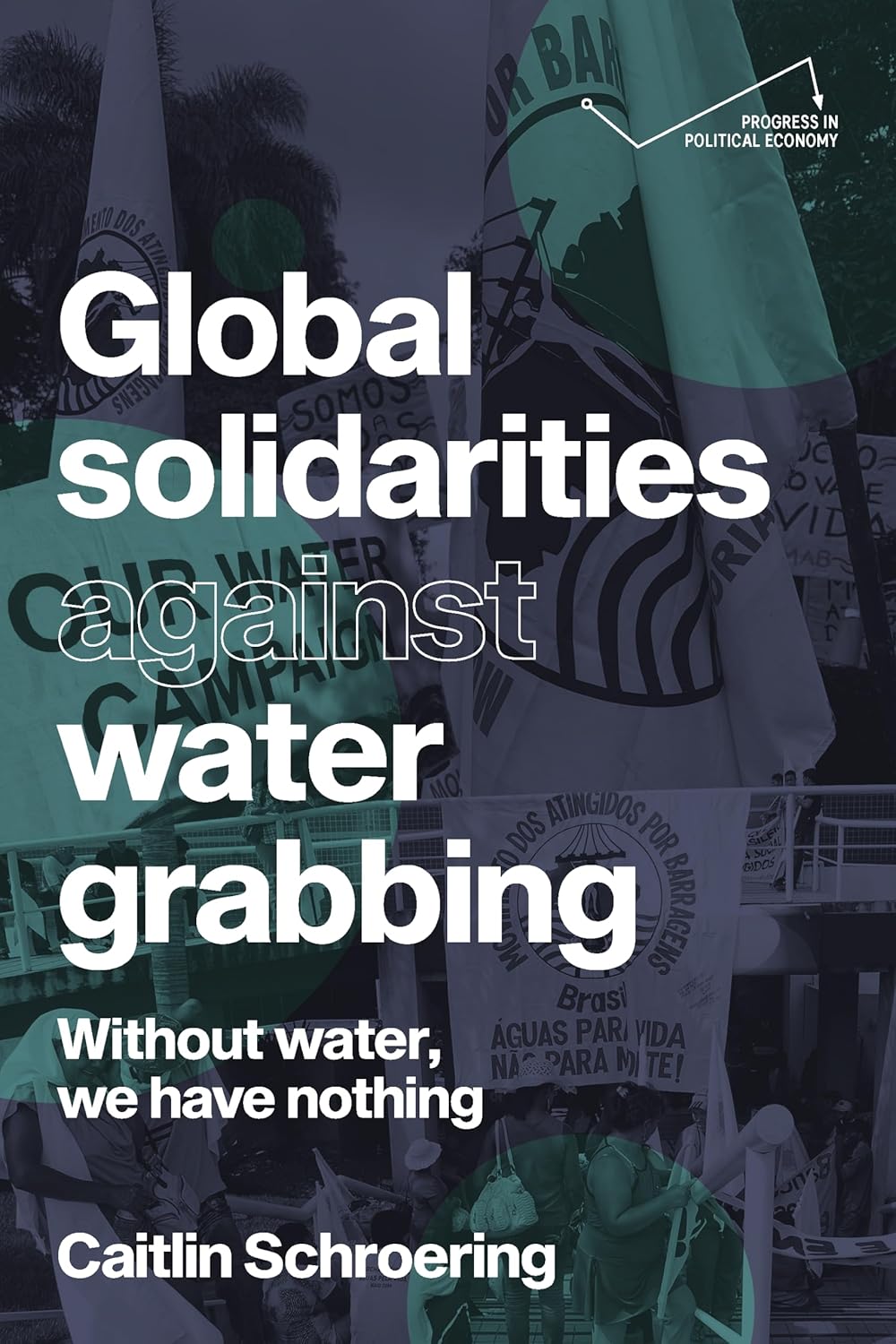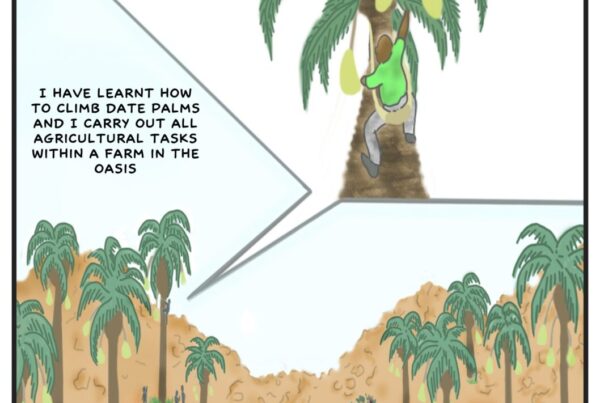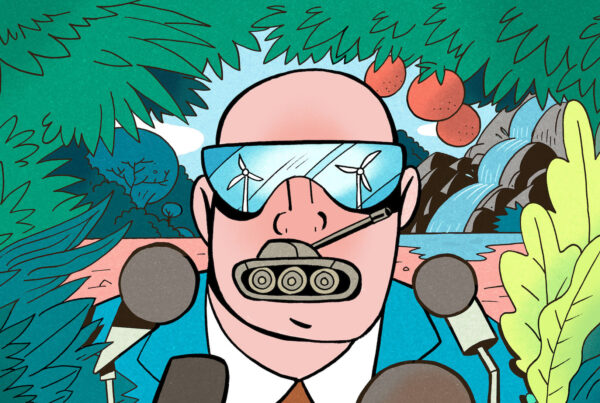By Lydia Karazarifi and Irene Leonardelli, in conversation with Caitlin Schroering
Water is not only essential for life — it is also a site of struggle, resistance, and imagination. In her powerful new book, Global Solidarities Against Water Grabbing: Without Water We Are Nothing (Manchester University Press, 2024), sociologist Caitlin Schroering examines how communities around the world are confronting the privatization and commodification of water. Drawing on years of fieldwork across three continents, Schroering traces how social movements — from Pittsburgh to Brazil and translocal networks in Lagos— are connecting their local struggles against water grabbing into a uniting global struggle for life and justice.
In this interview, the author reflects on her fieldwork experiences, the different meanings of water grabbing, the role of global solidarity, and the methodological challenges of doing engaged, feminist and decolonial research. Together, the conversation explores how movements are reclaiming water as both a material necessity and a political horizon — a reminder that, as the book’s subtitle insists, “without water we are nothing”.
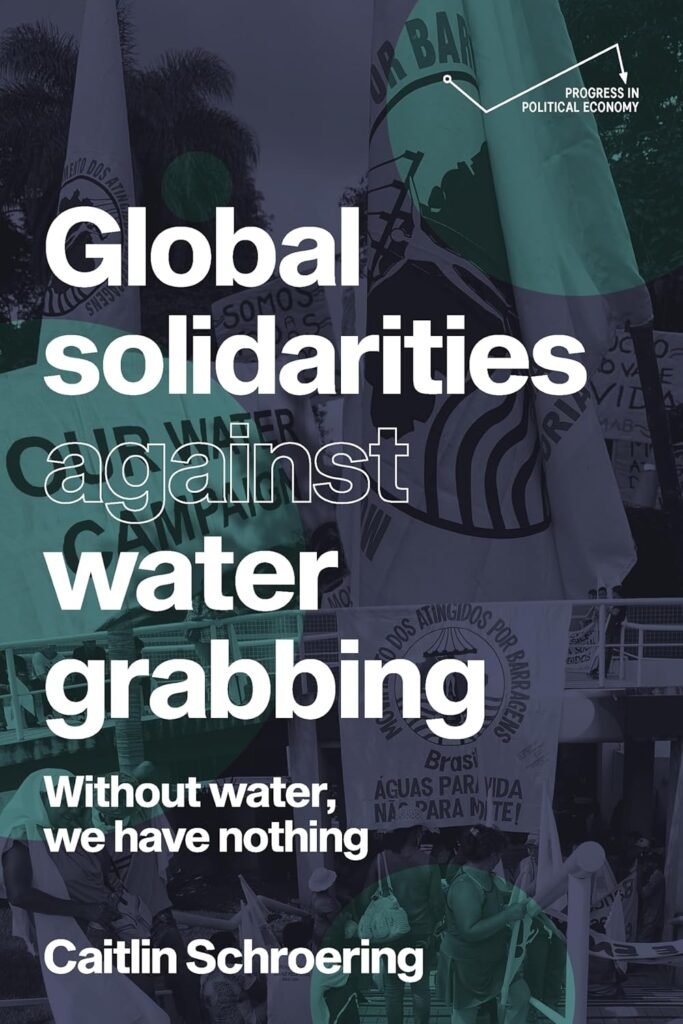
The book cover. Source: Caitlin Schroering.
Would you like to share with us how and why you started working on water movements and water conflicts?
I first became aware of the problems tied to water privatization when I was a junior in college. That experience really opened my eyes. When I returned to the U.S., I got involved in a number of social justice initiatives, including a campaign on my campus to ban bottled water.
After college, I continued organizing around various social justice issues—not specifically related to water at the time. I actually didn’t expect that water would become the focus of my research. But when I started my PhD—which I chose largely because of its emphasis on social movements—I was still very much rooted in activist spaces and eager to better understand how people organize.
Then, when I moved to Pittsburgh, the city was in the midst of a lead-in-water crisis. My own house tested at 100 parts per billion—well above the EPA’s threshold of 15 parts per billion, which requires immediate action. That experience made it clear to me that water wasn’t just an abstract issue—it was personal, political, and deeply structural. So, it began to make sense that my academic research would also focus on water.
As I discuss in the book, water is essential—we can’t survive more than a few days without it—and it’s deeply connected to broader systemic injustices, both social and environmental. People often refer to me as a “water scholar”, which is accurate. But for me, water is also a lens through which so many other issues come into focus.
Your book focuses mainly on the issue of water grabbing, so we were wondering if you could explain what this term means for those who might not be familiar with the concept?
In the book, I work with what I think is a pretty straightforward definition: water grabbing is the appropriation of water by capital.
If people are more familiar with the concept of land grabbing, it’s quite similar—except the resource being claimed and controlled is water. That said, land grabbing and water grabbing often overlap, since large-scale land deals often come with access to water resources, and vice versa.
To give more structure to the concept, I draw on a framework on the six forms of water grabbing proposed by Andreas Bieler and Madeline Moore (2023), outlining five main forms of water grabbing—plus a sixth that builds on them. These are based on accumulation of water by capital through (i) the bottling water, (ii) privatization of municipal water services, (iii) large-scale agribusiness use, (iv) industrial agriculture drawing massive amounts of water, (v) extractive industries like mining, (vi) large hydropower dams and (vi) financialization of water. The last form, financialization, is deeply tied to the others, as it represents the broader logic of commodifying water across sectors.
Initially, my research focused specifically on water privatization. But once I encountered Bieler and Moore’s framework, it really clicked for me: the term water grabbing allows us to connect seemingly disparate cases and movements.
For example, someone might ask: “How is a struggle against public-private water partnerships in Pittsburgh connected to resistance against mega-dams or mining in Brazil?” The answer is that these are all expressions of water grabbing—they’re all examples of capital appropriating water, whether for profit, control, or extraction.
And across all of these contexts, people are organizing to resist. Sometimes movements use the language of reclaiming the commons; sometimes it’s about defending water as a public good; and other times it’s as simple as saying, “water should not be privatized.” But wherever there is water grabbing, there is also resistance.
So, you said you started to engage with social movements in general and also some specifically on water in the U.S. But then how did you start engaging with water grabbing social movements in Brazil?
My involvement in social justice movements actually started very early. When I was five, my uncle passed away from AIDS-related complications, and my mother became deeply involved in activism around HIV/AIDS. She brought me with her to events and protests, and I think that really shaped my understanding that the way we respond to injustice is through organizing and resistance.
In college, I got involved with the student global AIDS campaign, and that opened my eyes to systemic issues—like the roles of the IMF and World Bank—and how they impacted public health globally. At the same time, in my classes, I was being introduced to environmental justice literature. That was when I began to see that the separation we often make between social and environmental issues is, in many ways, artificial. They’re deeply interconnected.
I had a chance to study abroad in Brazil. I’ll admit, my initial interest at 18 was shaped by that familiar—but problematic—narrative of the Amazon as “the lungs of the world.” But once I was there, I witnessed firsthand the impacts of a U.S.-based company destroying a local river system and disempowering communities. People told me, “Go back and tell the story. If people in your country knew what was happening, they’d stop it.”
I did go back. I told the story. But the reaction made me realize that it wasn’t so simple. It’s not just about raising awareness—there are structural barriers, political apathy, and competing crises. That experience planted the seed for me to think more seriously about research as a tool: How do we better understand social movements? What makes organizing successful?
That led me to a master’s program in Latin American Studies, where I focused on the role of religion—especially the Catholic Church—in Brazilian social movements. Eventually, I began a PhD at the University of Pittsburgh, with a focus on social movement studies. I didn’t go in planning to study water again, but as I mentioned earlier, the lead-in-water crisis in Pittsburgh quickly pulled me in that direction.
A few years into the program, my advisor brought in Rob Robinson—someone I mention in the book—to give a talk. He was also speaking at a housing justice summit. We struck up a conversation, and when I mentioned I’d been in Brazil in 2008, he asked, “Do you know MAB—the Movement of People Affected by Dams?” I didn’t. He said, “You should.” He introduced me, and things just started to fall into place.
That’s how my research evolved into a comparative project: looking at movements resisting water privatization in the U.S. and Brazil. Later, through my connections in the U.S. movement, I got involved in a struggle around corporate accountability in Nigeria—because the same multinational corporation, Veolia, was involved in both Pittsburgh and Lagos. So, a chapter of the book also explores that connection.
It’s been a kind of circular journey, but one where each piece led organically to the next.
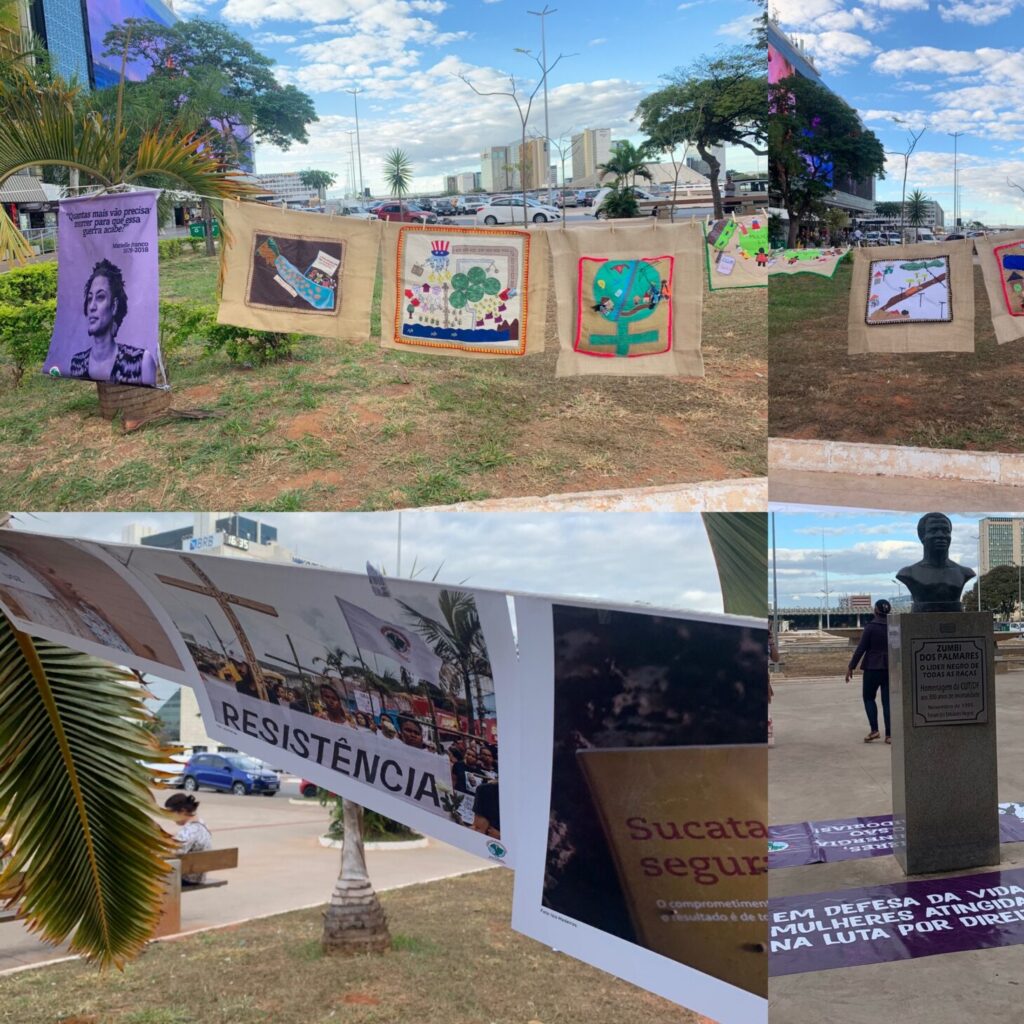
Arpilleras exhibit, Brasilia (2019). Image from the book. Source: Caitlin Schroering.
The next question follows up on this, as we wanted to ask about the movements you engaged with through your research for this book. What were some of the challenges you encountered in being both part of a water movement—actively believing in and contributing to the struggles—and, at the same time, working as a researcher? In other words, could you share some insights about your positionality while carrying out your research-activist work? We know these roles can’t be neatly separated…
While the book is centered on water, it really became, at a deeper level, a book about knowledge production—and about the tensions and contradictions involved in my own role as both a movement participant and an academic researcher. So, while it contributes to social movement studies and political ecology, it’s also very much a methodological reflection.
I didn’t come to this work as someone who started in academia and later discovered movements. I came from the space of organizing. My methodological approach is rooted in that trajectory—starting from activism, and only later entering the university. And I’m not suggesting there’s one “right” way to navigate the tension between being a scholar and a movement participant, or even that those two roles are fully distinct. In fact, I think that binary is part of the problem.
I’ve always struggled with binary thinking—this idea that you’re either “an activist” or “a scholar,” that you must choose one role over the other. My approach has been shaped by many conversations with others—both academics and organizers—who are grappling with the same questions.
At the end of the day, I try to be transparent. Yes, I occupy both spaces. And that positionality inevitably shapes the way I do research. One of the core ideas guiding me is that neutrality is a myth. This isn’t a radical idea in political ecology—many scholars have said it before—but I’ve found that in U.S.-based social movement studies, there’s still often an assumption that to be “rigorous,” research has to appear neutral or detached.
But pretending to be apolitical is, in itself, a political stance. As the Brazilian sociologist Florestan Fernandes put it, for a sociologist, there’s no neutral ground: you are either on the side of the oppressor or the oppressed.
So yes, the research shaped the book, but it also changed me—and shifted the project in the process. While the core focus remains on water and resistance to water grabbing, the book also wrestles with what it means to produce knowledge with and within movements.
I quote Rebecca Tarlau in the book—she’s done work with the MST (Landless Workers’ Movement) in Brazil. She says something like, “Social movements don’t need academics”—and I think that’s true. But she also argues that there’s still a space for researchers to be part of these struggles, to work in collaboration. That really resonated with me.
Another influence was Amita Baviskar, whose work on dam struggles in the Narmada Valley in India helped shape my own thinking. Her approach really informed the way I thought about my own work in this book. I cite her discussion where she points out that, while positivist scholars often assume that inquiry can or should be value-free, research is in fact inherently guided by the values of the researcher — values that shape the research agenda as well as the choice of theory and methodology.That quote gets to the heart of my approach: research is never value-neutral. The question is whether we acknowledge that openly—and what we choose to do with that awareness.
And we think this also connects strongly to a feminist perspective — to what many feminist scholars have long argued: that all research is political, and that there is no neutral space from which a researcher, or anyone, can speak. So, following on from that, we were particularly interested in the your feminist and decolonial approach to research…
For me, a feminist approach means looking at how systems of oppression — including capitalism and its extensions of imperialism, patriarchy, and white supremacy — are deeply interconnected.
To get at the core of your question about how this plays out in my work: I’m currently doing ongoing research in Brazil around popular education, knowledge production, and the struggle for climate justice. The movement I work with, MAB) — the Movement of People Affected by Dams — is about 70% women. It’s very much a movement led by women, and that reality shapes its political imagination and organizing practices.
MAB is part of the transnational network La Vía Campesina, a global movement for food sovereignty. For decades, La Vía Campesina has mandated gender parity in leadership, ensuring that at least 50% of its leaders are women. Many of its member movements, including MAB, have ongoing internal dialogues about gender and power. Of course, these are not utopian spaces — they are made up of human beings who continue to live within deeply entrenched structural realities. But these efforts represent important steps toward more equitable forms of collective struggle.
MAB’s pedagogy focuses on the interconnected systems of oppression throughout contextualized and historical understandings that signify alternative transformative pathways. Through that sense, feminist and decolonial research is not just about analyzing injustice — it’s about understanding how people are already creating alternative ways of living and knowing, rooted in care, equality, and resistance.
Last year, when I was in Brazil during the Northern Hemisphere summer, I was interviewed and asked: “What does decolonial mean to you?” I remember thinking that my answer to that question often shifts depending on the audience. But what I said then — and what I’ve continued to reflect on — is that I tend to use the term anti-colonial, rather than decolonial, to describe my approach, because of my own positionality of where I live and where I’m from. I’m a white person living in a settler colonial country. So rather than claiming to be decolonial, which might imply a kind of moral or political arrival, I prefer to frame my work as anti-colonial — as an ongoing practice of resistance. It’s similar to how we talk about being anti-racist: acknowledging that we are all still shaped by and implicated in systems of oppression, but making a conscious commitment to act in solidarity against them.
For me, anti-colonialism is a methodology. It shapes how I write, how I think, and how I reflect on my own positionality. It means recognizing that movements like MAB don’t need me to study them — rather, as I mentioned before, my research becomes a space of dialogue between theory and praxis.
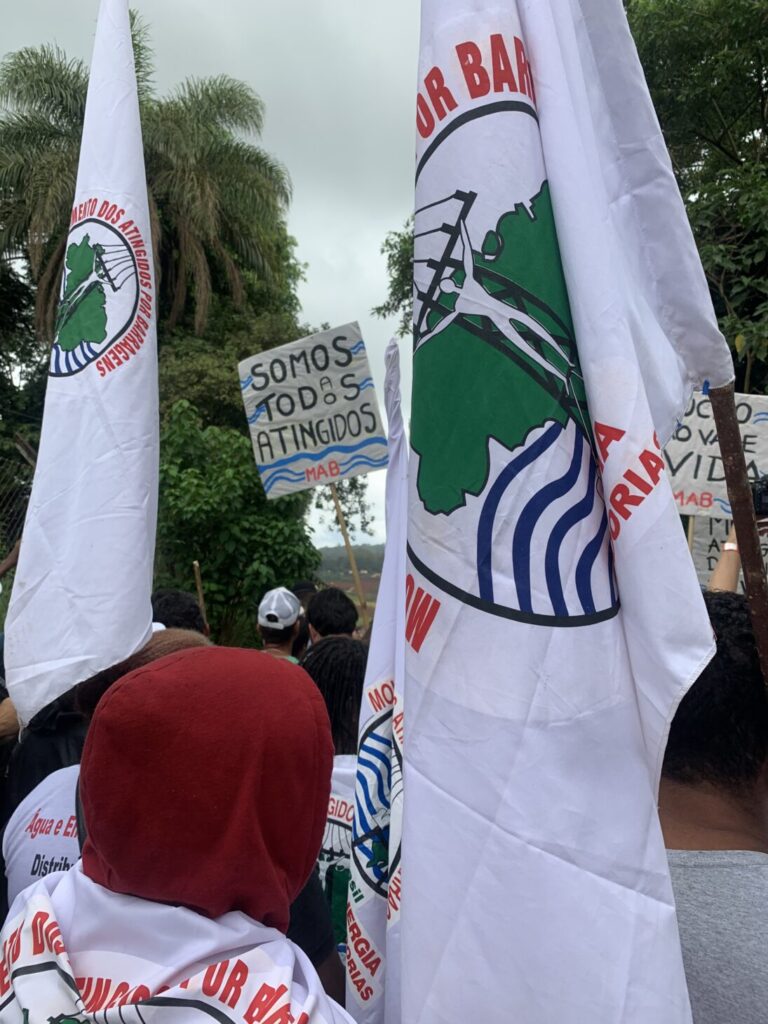
One year commemoration of Brumadinho crime (2020). Image from the book. Source: Caitlin Schroering.
An inspiring methodological tool that you used during your fieldwork? Something that helped you deal with all the tensions…?
I think one of the things I followed quite closely from what I learned in my qualitative research methods classes was the importance of taking lots of notes — or “jotting.” So, if you’re in a moment or in a space where it’s not appropriate to stand in the corner scribbling in your notebook, you just jot down a few keywords to help you remember. Then, at the end of the day, you take time to reflect on those notes.
For me, something that really helped — especially after a long, exhausting day — was sending myself a quick voice memo. It was a way to process my own feelings and observations about what had happened, and those recordings later became very useful to listen back to.
There were also a few moments when I debated whether to quote or cite something from my own field notes. In the end, I decided yes — to include those reflections in the book. So I cited myself, noting the date and place they came from.
I think one ongoing challenge for me, maybe more in my head than anything else, is finding the balance between not over-centering myself in the work, but also not erasing myself entirely. Too often, I read research and wonder: how did this process change the author? How did it shape their thinking? What is their connection or commitment to the movement they’re writing about?
So, for me, it became about finding that balance — telling the story not as a hidden observer in the corner, but as a participant. In my case, that was true: I was part of the movement I was writing about. Of course, that approach doesn’t work for every project, but it made sense for mine.
In your view, what forms can global solidarity take, and how can social movements around the world collaborate, coordinate, and support one another?
I use the term translocal to describe how solidarity takes shape across movements — and I’ll start by saying, that my students tease me about this all the time. They ask me: “Why do academics always like to create another word to say the same thing??And no one knows what it means.” And honestly, it’s a fair critique.
So you can use the term international or global… but still, I find translocal to be a useful concept, because it captures something specific that words like “international” or even “global” don’t quite get at. I draw on the definition used by scholar Bobby Banerjee, who developed the term in the context of Indigenous and community-based struggles, meaning communities fighting, living, dying, struggling for livelihood for the commons in their region of the world.
Translocality also de-centers the nation-state as the main unit of analysis. It recognizes that solidarity can happen between communities, movements, and people who are resisting the same patterns of exploitation in different parts of the world.
In my work, I talk about translocal learning networks — spaces where movements exchange knowledge and strategies. These can take physical form, through international gatherings, or digital form, through tools like Zoom and other online platforms. For instance, Brazilian scholars Breno Bringel and Flávia Braga Vieira describe how Brazil’s Landless Workers’ Movement (MST) embodies this translocal dimension: some of the most internationalized movements are also the most deeply rooted in their local territories. They’re localized, but not localist.
I think that captures something powerful. In my book, I write that translocalism destabilizes existing categories — like statehood or citizenship — and instead reinforces shared experiences through which solidarity can grow.
One example comes from chapter six of my book, where I describe the collaboration between the Our Water Campaign in Pittsburgh and a movement in Nigeria. Activists in both places were confronting the same transnational corporation — Veolia — in their struggles against water privatization. These are translocal connections: the recognition that, whether it’s a hydroelectric dam, a bottled water company, or privatized municipal water, people are fighting the same fight against water grabbing and learning from each other in the process.
This also challenges old assumptions about the “flow” of knowledge from the so-called global north to the global south, which to me is kind of just like ridiculous. I think it’s a very colonial idea that simply isn’t true.
We would like to thank you for these very inspiring insights. What you said also reminds us that there is currently a form of water apartheid in Palestine, where people are being restricted from accessing water, food, and other essential resources. This makes us wonder about your thoughts on the different meanings water can have, and how it connects to various struggles and hopes for change.
I think it’s part of the same pattern — if you destroy land, if you take land, if you take food or language, then taking or disrupting access to water is the same thing. It’s another way of destroying, or attempting to destroy, people’s lives and cultures.
But I think there’s also something very hopeful — a really beautiful example that’s happened recently. After a decade-long struggle led by Indigenous peoples in what is now called California and Oregon, most of the dams on the Klamath River have finally been removed. And for the first time, Indigenous youth have kayaked down the river again, and salmon are already reappearing.
To me, that’s an example of — and I don’t always like this word — but of resilience. It shows that life, the earth, and people can regenerate. There’s no going back to what was, but something new and different can be created. What often limits us is this mindset of “we can’t” or “that’s impossible.” It’s that kind of thinking that keeps things as they are.
So, when I think about water — and how it’s held as sacred, and how it’s understood across different geographic and cultural spaces — the common thread is that we all depend on it. Without water, we can’t live; we have nothing. And I think approaching it from that perspective can be an entry point for connecting all of these different struggles.
Because, even in the U.S., there are about a million people who don’t have piped water in their homes — something most people assume doesn’t happen there. And beyond that, there are millions more whose water is contaminated with heavy metals and unsafe to drink. If you don’t have housing, you can’t just turn on a faucet and get water. So even in that specific context, it’s connected — to housing, to land, to inequality. It’s all interconnected.
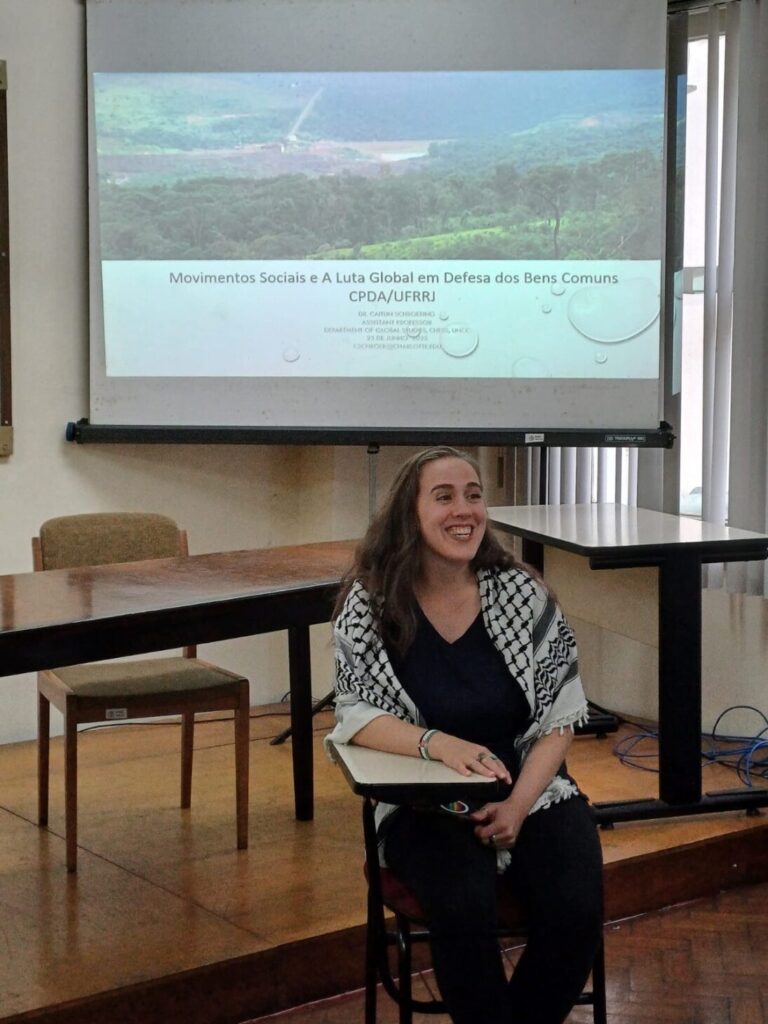
Photo of the author, Caitlin Schroering, after giving a talk about her research in Rio de Janeiro, Brazil (2025). Source: Caitlin Schroering.
—


